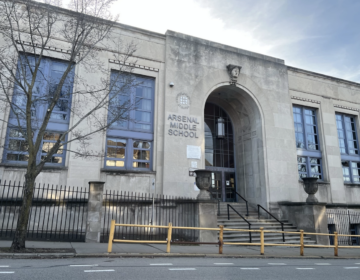Philly’s prodigal son: The making — and near breaking — of a Black male teacher
Shakoor Henderson is back in the city that nearly destroyed his parents — doing a job no one would have expected. All thanks to a teacher in his past.
It’s a mid-January evening, 2020. The doldrums of the school year.
Through the drone of fluorescent lights, a whistle’s chirp signals the end of basketball practice at Mary McLeod Bethune Elementary School in North Philadelphia.
Coach Shakoor Henderson begins to clear the gym.
Yo … yoooo … time to go home …
Middle schoolers swarm the 27-year-old teacher after every few paces, peppering him with questions and friendly banter. He indulges them briefly, breaking away each time with a variation on the same phrase.
I love y’all … be safe
Alright, I love y’all
I love y’all … adios!
With Nikes strapped to his feet and tattoos written down his arms, Shakoor has the Pied Piper presence of a hip, young teacher. At one point, as he winds through the hallways back to his room, a student literally stops him to ask for a picture.
“Oh, that’s facts,” Shakoor says with a smile and a pose.
A certain magic surrounds good teachers. Shakoor seems to have it.
In Shakoor’s first year as a seventh grade math teacher, his students blew past expectations on their end-of-year assessments.
“Some people are naturally gifted and called to this work. And I think he’s one of them,” said Aliya Catanch-Bradley, Bethune’s principal. “I dare not say he’s a unicorn because if he sees that in writing, his head would be just so big.”
Black male teachers like Shakoor aren’t as rare as unicorns. But it’s close. About 2% of all public school teachers in the United States are Black men.
There’s a growing push to hire more Black male teachers because there’s evidence that Black teachers are particularly effective at teaching Black children.
School leaders across the country are looking for the next Shakoor Henderson.
Problem is, with this Shakoor Henderson, a web of red tape may soon force him out of the public school he loves.
“I want to be around. I want to teach,” he said. “This is, like, my thing.”
To understand how Shakoor reached this crossroads, you need to know a lot more about him.
Really, you need to know his life story.
It was a long, rocky, uphill path to this point — a hero’s journey worthy of its own “Odyssey.”
It’s a tale rooted in the Black male experience, and it drives to the heart of why there are so few Black male teachers in America.
This story was produced as part of WHYY’s Schooled podcast. You can listen above, or subscribe wherever you get your podcasts.
***
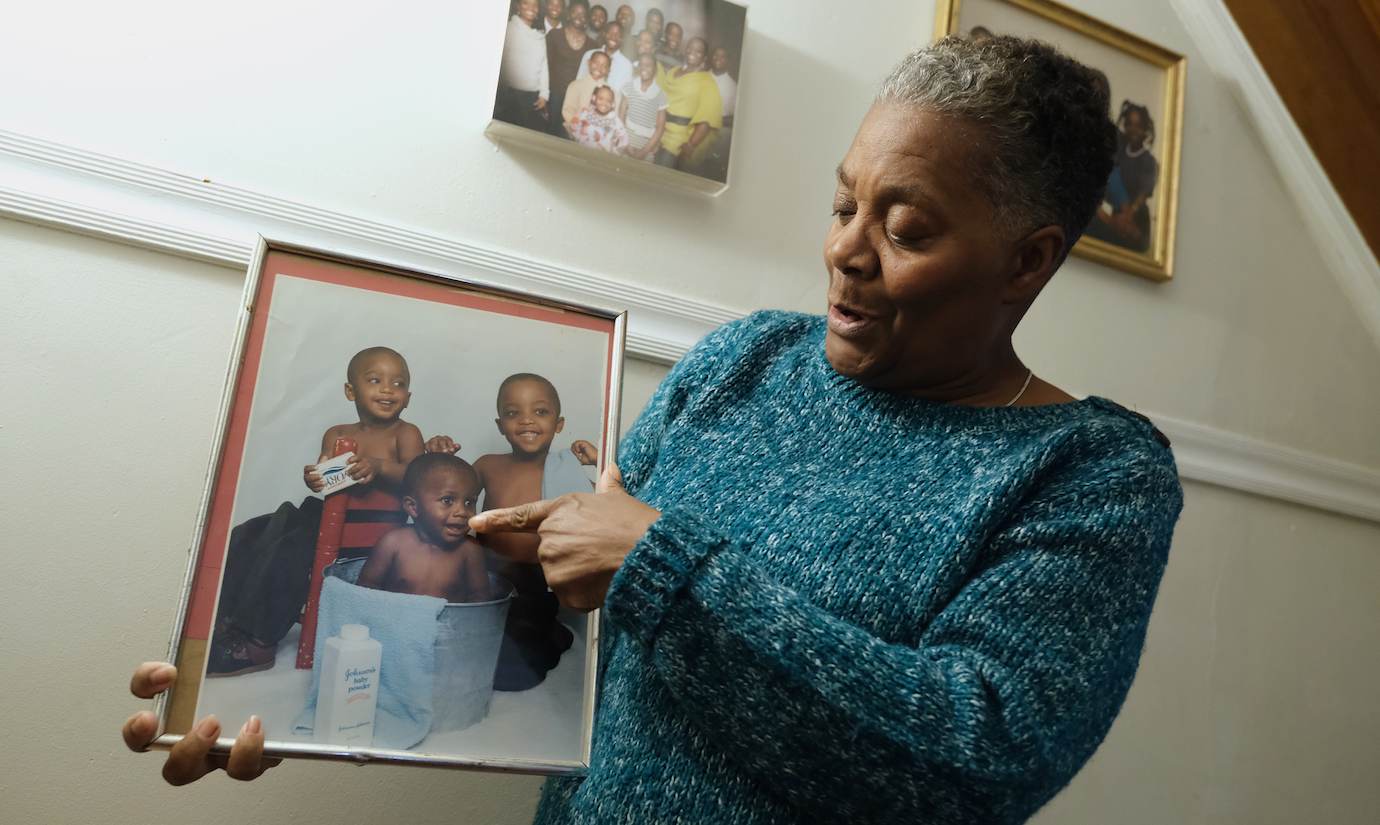
Milk and honey
Shakoor Henderson has two homes: North Philadelphia and North Central Pennsylvania.
Williamsport, Pennsylvania, to be precise.
The once-gilded logging town of about 30,000 people sits on the West Branch of the Susquehanna River, the last major stop before Northern Pennsylvania opens up into miles of wilderness.
Joanne Henderson arrived in Williamsport on June 3, 1988 — for what she thought would be a two-week break from the chaos of her existence in Philadelphia. But something changed the moment she arrived, when her eyes met the tree-covered ridges that frame the town’s southern edge.
“It just looked like the land of milk and honey,” said Joanne. “And sometimes, you have to remove yourself from your environment to get a new perspective.”
Joanne had a stable upbringing in North Philadelphia. Two loving parents. A life that was, in the broadest sense, good.
Then, in the early 1980s, her parents died four months apart, and she came undone, seeking solace and escape in drugs.
After years of recovery and relapse, her husband took their three children to Williamsport and convinced her to join.
In the late 1980s, Williamsport became an unlikely mecca for people recovering from drug addiction. Many, like Joanne, arrived from big cities scarred by the crack cocaine epidemic. The influx triggered a backlash from the residents of the mostly white city. Joanne didn’t care.
If anything, the backlash stiffened her resolve to stay.
“This is milk and honey,” she said to herself. “I’m not leaving.”
Joanne’s first marriage dissolved, but through the recovery community she met Tony Henderson, a Navy veteran from North Philadelphia.
They married, blended their families, and had three more children together.
The last — the baby — was Shakoor Henderson, born in December 1992.
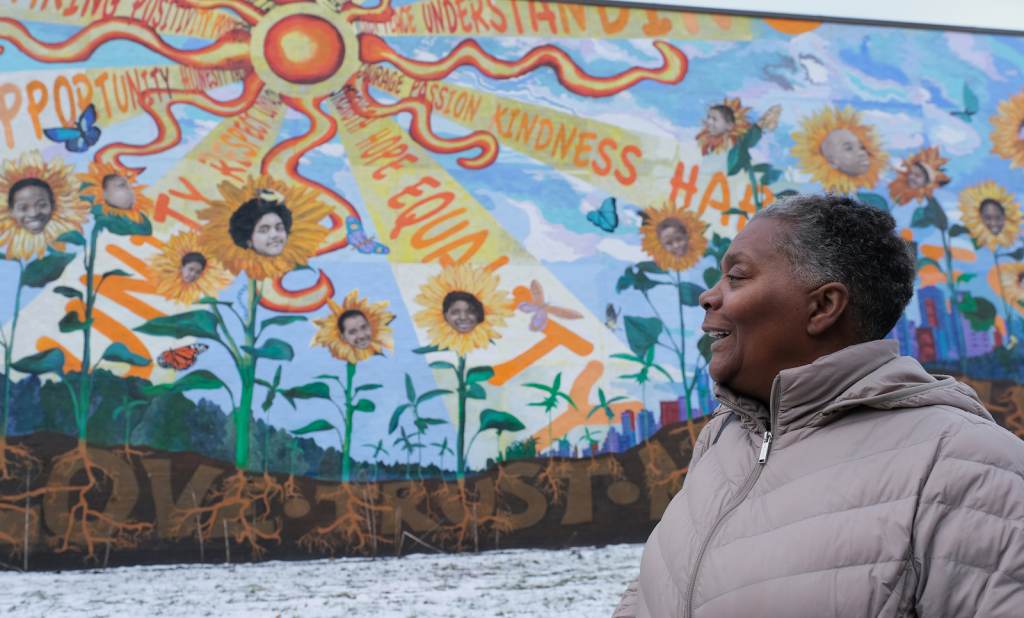
Down the slide
He was stubborn and strong-willed from the start.
In Shakoor’s earliest school memory, he’s standing at the top of a large metal slide while a large and impatient classmate urges him to go down. He won’t do it. Not out of fear.
“Out of rebelliousness,” he recalled.
“I’m gonna go down when I want to … I’m not gonna go down because you want me to.”
Eventually, the classmate shoved him down the slide, which led to a bloody collision, stitches, and the permanent loss of a small bit of eyebrow.
The rest of Shakoor Henderson’s educational career — his life, really — has been a variation on that first school memory.
In football, he wanted to run through people, not around them. He preferred defense because he didn’t have to stand still before the play started or follow scripted movements.
In class, he was equal parts bright and troublesome. He’d speed through schoolwork and grow restless, which often led to disruption and discipline.
Joanne tried not to use negative words. Shakoor was “challenging, spirited, misunderstood.” He wasn’t “bad” — not to her, at least.
And she was a relentless advocate. When someone at the school suggested Shakoor go on medication for attention deficit hyperactivity disorder, or ADHD, Joanne refused. No one was going to dull her son’s edge.
“Her exact words were, ‘That’s not my child,’” Shakoor said.
Tony was the same way as a kid — smart with a mischievous streak. He and Joanne pushed the school to give Shakoor more work to keep him busy. And over summers, they made Shakoor and his siblings do book reports on famous Black historical figures to fill in gaps they saw in the regular curricula.
Sometimes, Shakoor would take the things he learned from his parents and use them to push back on things he learned in school.
“In history class … he’d say, ‘No, that’s not how it happened,’” Tony remembered.

At the time, Williamsport was 90% white.
Take race out of the equation, and Shakoor still would have been a smart kid with an authority problem. Not always the best combination.
But on top of that, Shakoor was a headstrong, self-possessed Black kid in Williamsport.
“And that’s why I always got labeled ‘bad,’” said Shakoor. “Maybe I didn’t act like everybody else. But on top of that, I was Black, not acting like everybody else.”
Childhood defiance turned to more concrete trouble in middle school, when Shakoor began dealing weed — as much for the thrill as the money.
In ninth grade, Shakoor had his most serious run-in yet with the law. He and some friends drove a stolen car and led police on what Shakoor described as a “little chase.”
That landed Shakoor on probation, which he violated in 11th grade by getting into a fight.
The probation officer wanted to send Shakoor to juvenile detention. But first, Shakoor had to go before a judge, who would only send Shakoor to detention with parental permission.
Tony and Joanne remember arguing in the courtroom — trying to decide, in real time, whether their teenage son would go home with them or to a juvenile detention center for six months.
Tony remembered growing up in North Philadelphia, seeing friends go to jail, and assuming that he would end up there, too.
“My mentality was, being Black, eventually I got to get locked up,” he said. “I didn’t want my son to feel that way.”
He told the judge that Shakoor would be better off with a lesser punishment.
Joanne disagreed. She saw a chance to give her son what she’d gotten from Williamsport — a break from the chaos of home.
“This had turned into that hellhole for him,” said Joanne. “He was involved in a lot of negativity in this town.”
Her instincts told her to act.
“I’m a parent. I’m going to do what’s necessary in my mind’s eye and what I believe is going to help save my child,” said Joanne.
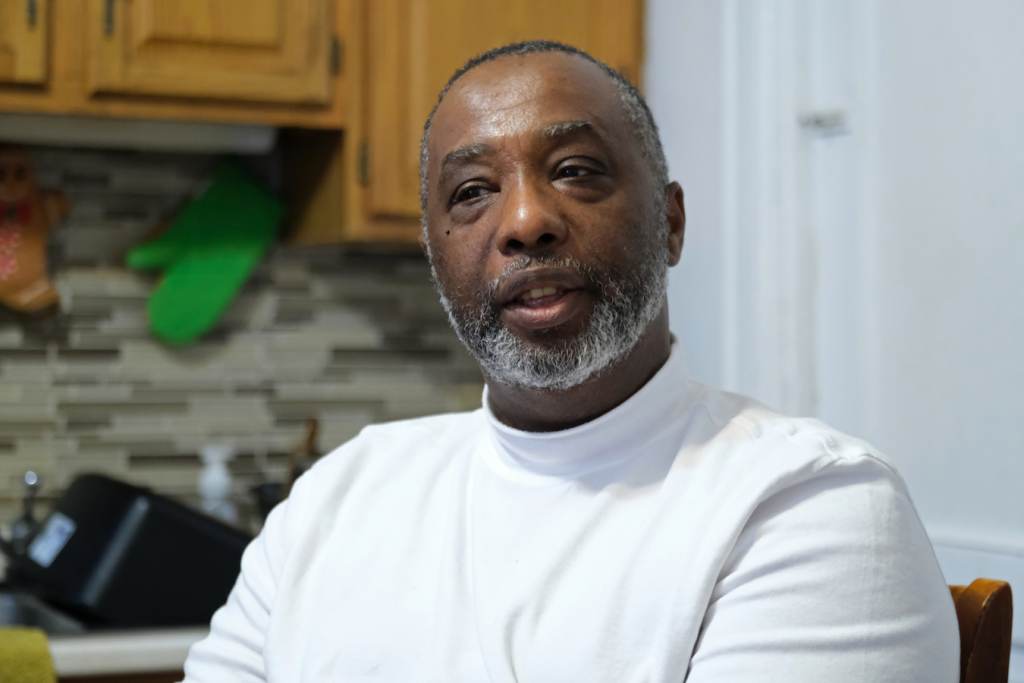
The judge sided with Joanne. At 17, Shakoor was to leave the courtroom in Williamsport and go straight into detention.
Shakoor felt shocked, betrayed. His mom had been his biggest advocate — the one who insisted he wasn’t bad, just misunderstood. Now, she was the one who blessed him being sent away.
Joanne felt — and still feels — it was the only thing that could have changed Shakoor’s trajectory.
Tony felt — and still feels — it was a mistake.
“Listen, she’s an African American woman. I’m an African American man,” said Tony. “I still feel like I don’t want to create a situation where you become all right with being locked up. And she looked at it like, `I’m saving your life.’”
‘It was hell’
Shakoor’s six months at Abraxas Youth Center probably deserves its own story. Three hours south of home in rural Franklin County, it was a place where he says psychological, and sometimes physical, tactics were used to break defiant kids like him.
The moment Shakoor’s van pulled up at the facility, he recalled, staffers grabbed him and began screaming to “get out of the seat.” Within a half-hour, they’d shaved his head, tossed him a towel, and told him he had two minutes to shower and use the bathroom.
Shakoor believes it was all designed to convey a sense of powerlessness.
Stand still while someone screams at you. Frantically finish showering while someone counts down the seconds outside your stall. Endure the constant threat of punishment for the smallest infraction.
“It was hell,” said Shakoor. “I understand the logic behind it. I’m not dumb. But at the same time … I was a child.”
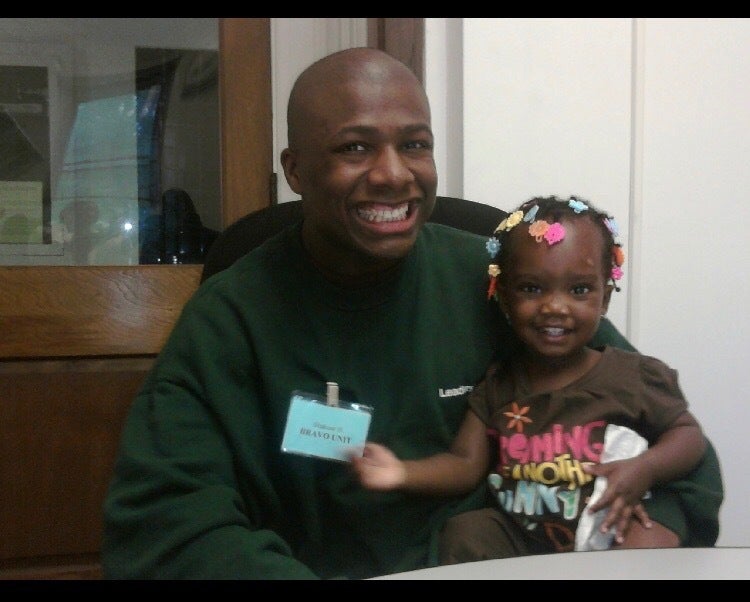
The juvenile facility where Shakoor lived was on top of a mountain. It felt like exile.
Shakoor rolls his eyes a little when he talks about the militaristic rules. But when he talks about the loneliness of lock-up, he turns melancholy.
“When you’re there, you’re there by yourself,” said Shakoor. “And I’m thinking of everybody while I’m doing whatever it is I’m doing there. And I’m wondering, are they thinking about me?”
In many cases, the answer was no.
Before he went to Abraxas, Shakoor was a promising football player drawing interest from college coaches. When he went away, the interest withered.
He wrote letters to the coaches who had contacted him. None of them wrote back.
Outside his family and girlfriend, only one person responded to a letter Shakoor wrote during his six months in juvenile detention — a person who helped forever change his life.
***
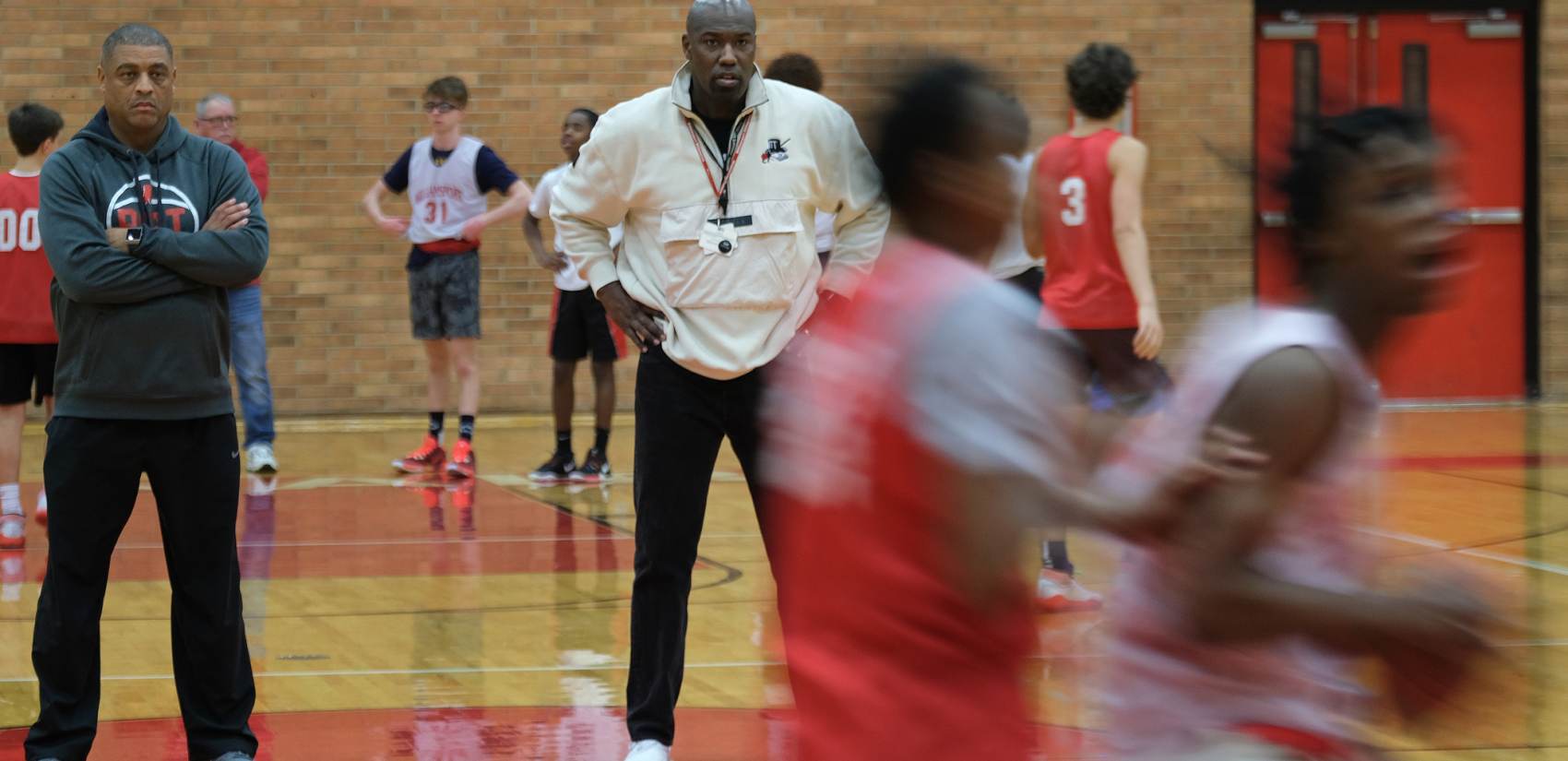
Hope arrives in the mail
Allen Taylor. Mr. Taylor. Coach Taylor.
His own life had mirrored almost every step of Shakoor’s, only about two decades before.
He and Shakoor Henderson landed in Williamsport for the same reason: recovery.
Allen Taylor was born in Wilmington, but moved to Williamsport with his mom as she struggled with addiction. It was an uneven road, and there were times — as early as middle school — when he essentially lived by himself and took himself to school while his mom cycled through recovery and incarceration.
Like Shakoor, Taylor was a star athlete, playing basketball at Williamsport Area High School during the program’s heyday in the late 1980s. But success on the court and in the classroom didn’t shield him from the streets. Seeking companionship and fast money, he became a small-time drug dealer in his teens
After nearly winding up in prison, Taylor ditched dealing and headed to college — eventually becoming a math teacher at Williamsport Area High School and head coach of the men’s basketball team. He is still, today, one of four Black male teachers in a school district with over 300 educators.
He was the first Black male teacher Shakoor remembers having in school. But their connection went beyond race and gender.
“He was headed down the same road I was,” Taylor said. “And my concern was, ‘Look, man, you’re gonna continue to do X, Y, and Z. And at some point, you’re gonna pay a price. And it’s gonna be a heavy price.’”
He also knew Shakoor through Williamsport’s recovery community. His mom was friends with Shakoor’s parents, and he’d come over to the Henderson house regularly to play chess with Tony on their porch.
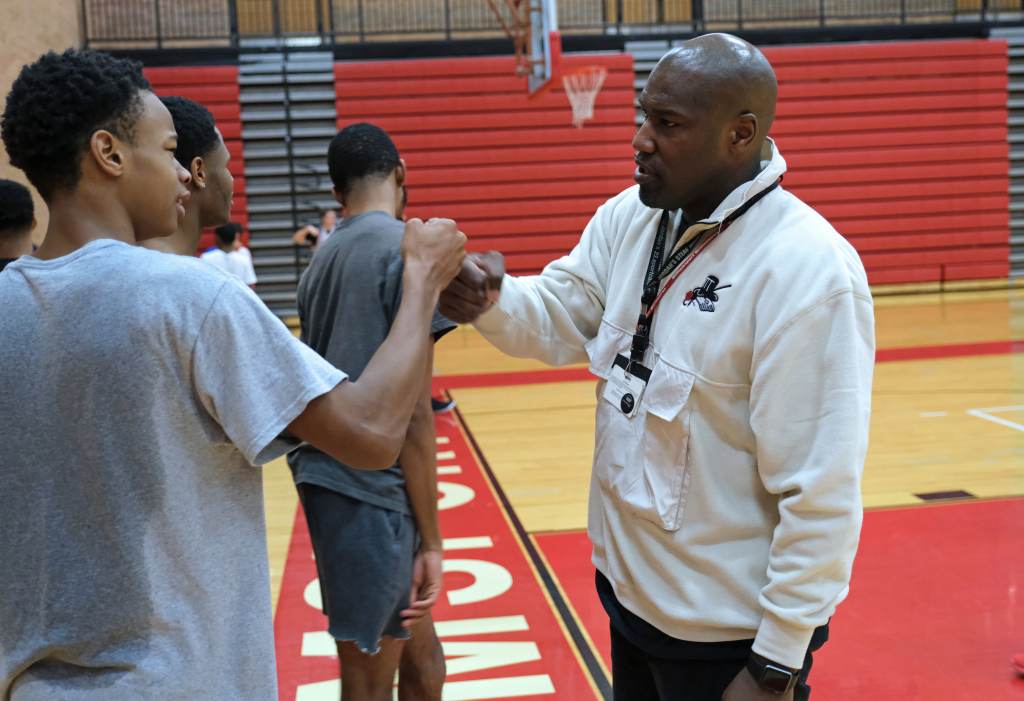
While in school, Taylor would pull Shakoor aside for little chats — sometimes dropping cryptic warnings.
“He’d be like, ‘Man, you don’t really want this,” Shakoor said. “He’s a very calculated person. He’s a chess player. Always two or three steps ahead.”
Shakoor listened with reverence, but the message faded when he was beyond Taylor’s gaze. After the fight that ultimately led to his time in juvenile detention, Shakoor remembers his disappointment and his head-shaking line:
“You just couldn’t help yourself.”
By the time he was at Abraxas, Shakoor figured the relationship was strained beyond the point of communication. He never expected a letter back.
But Taylor knew what Williamsport was like for a young black kid and a child of recovery. He knew where Shakoor had come from. He knew where Shakoor was going.
“Words do matter,” Taylor said. “Had I told the young man you ain’t … and you’ll never be … that’s what that kid’s gonna believe. I’m just thankful that’s not what I did.”
The letter itself is lost to time, swept away during some spring cleaning after Shakoor left Williamsport. But the content mattered less than the fact that Allen Taylor wrote it.
“It gave me that [feeling], there is life after this,” said Shakoor. “I can still go back, and I can change some things.”
Fighting to ‘change my narrative’
The letter gave him hope, but it was not some pixie-dust inflection point.
Nor was his time in juvenile detention. Years later, Shakoor still wrestles with how to judge that time in his life.
“It didn’t turn me into an amazing leader, you know, and I will never give them that credit because they’ve done more harm than good. I always stand by that,” Shakoor said. “That being said, they did change my perspective on things, and it was mostly because of the craziness. I’m like, I never want to be in this position where somebody is controlling me.”
Shakoor returned to Williamsport to finish high school and was eventually accepted to Clarion University, a state school in western Pennsylvania.
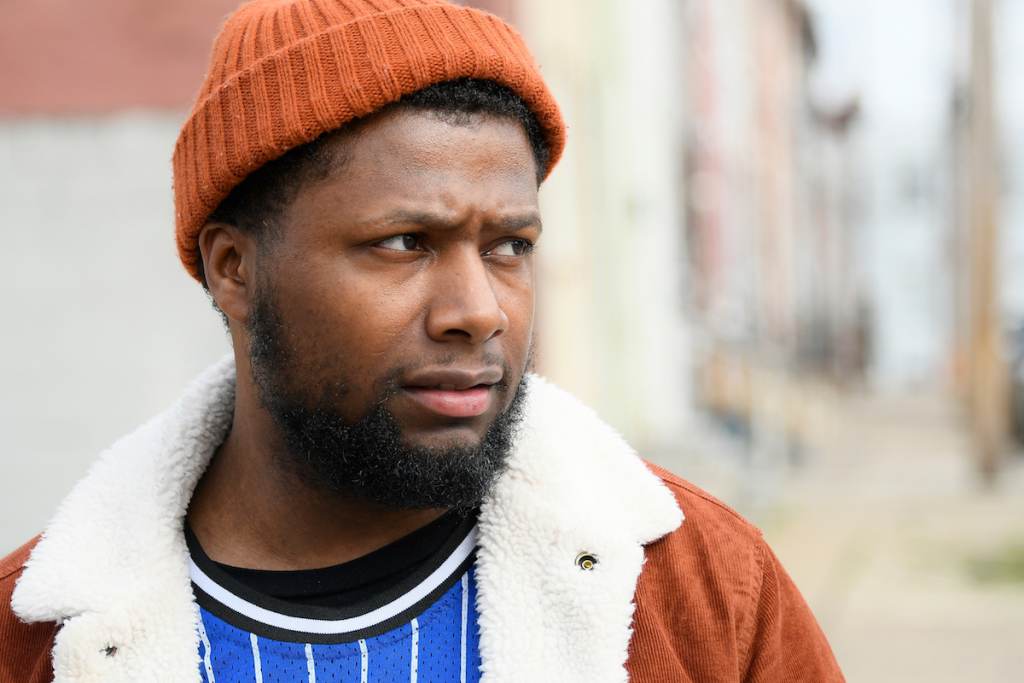
Shakoor, though, was pulled between those competing visions of himself for years. And college was yet another whirlwind, spanning seven years, four schools, and several life-altering pivots.
He left Clarion after one semester and transferred to Lock Haven University near Williamsport. It proved too close to home and too close to trouble.
In 2012, about a year after Shakoor graduated high school, authorities accused him and his older brother of several felonies tied to a robbery. Prosecutors offered a plea deal that, by Shakoor’s recollection, would have given him a prison term of 10 to 20 years.
Shakoor and his brother insisted they had nothing to do with the robbery, saying it was a case of mistaken identity.
After a key witness recanted, Shakoor said, authorities countered with a plea deal for six months. At the time, Shakoor’s brother was already in prison because he’d been on probation. With time served, he could take the deal and come home. Shakoor pleaded with him to continue the fight.
“Because if you admit to it, that means I did it, too. And we didn’t do it,” Shakoor remembered telling his brother.
Again, Shakoor’s fate — his freedom — sat in the hands of a family member. This time, he won the argument. His brother rejected the deal, and authorities eventually dropped the charges.
Before the 2013 spring semester, Shakoor transferred from Lock Haven University to another state school farther away, Bloomsburg University. It was another bid to clear himself from the hang-ups of his hometown.
His hometown had other ideas.
On the evening of Jan. 9, Shakoor called his cousin, Terrell, at 5 p.m. They were supposed to meet up with friends — not unusual since they’d grown up together, almost like brothers. In a few weeks, they were supposed to head to Bloomsburg together.
But it was unusual when Terrell didn’t pick up.
At 5:29, Shakoor’s brother called, frantic.
They shot ’Rell. They shot ’Rell.
Two men had executed Terrell in a Williamsport alley during a botched drug deal.
Shakoor already felt his life careening. He’d just turned 20. He was less than three years removed from juvenile detention, and just months removed from allegations that could have sent him to prison.
After Terrell’s death — as Shakoor was about to attend his third college in less than two years — the chaos reached a crescendo.
“The environment I was in at the time was so dangerous, man,” Shakoor recalled. “I went to the funeral with a gun, right, because somebody might try something while I was there. That’s the mindset I was in.”
History seemed to be repeating itself. The cycle his parents were trying to break — drugs, violence, tragedy — was turning in on him. And there seemed to be no escape.
At that point, Shakoor couldn’t think about higher education. But his dad wanted him to leave Williamsport, fearing something else would happen. So Shakoor muddled through and headed to Bloomsburg. He pulled up that semester in front of his dorm with a trash bag full of clothes and a handgun.
“In no way was I thinking about school,” Shakoor said.
His grades were a disaster. He drank. He partied. He describes it as self-medication. Academic troubles forced him to a fourth school, Lincoln University in Chester County. He was quickly expelled for having a gun on campus against school rules.
Amid the academic false starts, he fell back into dealing, and that positive vision of his life started to dim.
The chances of Shakoor graduating college — much less becoming a teacher — seemed slim. He hoped only to slow down, go back to Williamsport, avoid street life, and get a day job.
He found one as a technician at a rehab center, the same one where his dad and Allen Taylor’s mom had once been patients.
Shakoor liked the job, but the pay wasn’t great. After one especially disappointing paycheck, he started complaining to an older coworker who had no time for a young man’s complaints.
“If you don’t like this, shut up,” the nurse told him. “Go back to school.”
She sounded a little like the impatient girl on the slide. Just go down already. Just do the thing. Shakoor had gotten that message before from a lot of well-meaning people. But somehow, this time, it stuck.
Whether by divine intervention or pure coincidence, Shakoor said it was this nurse at his dad’s old rehab center that convinced him to give school a final try.
“I just got to walk out on faith and trust myself and just trust that I got this,” Shakoor said.
This time, he did.
He returned to Bloomsburg and in spring 2018 graduated with a dual degree in history and philosophy.
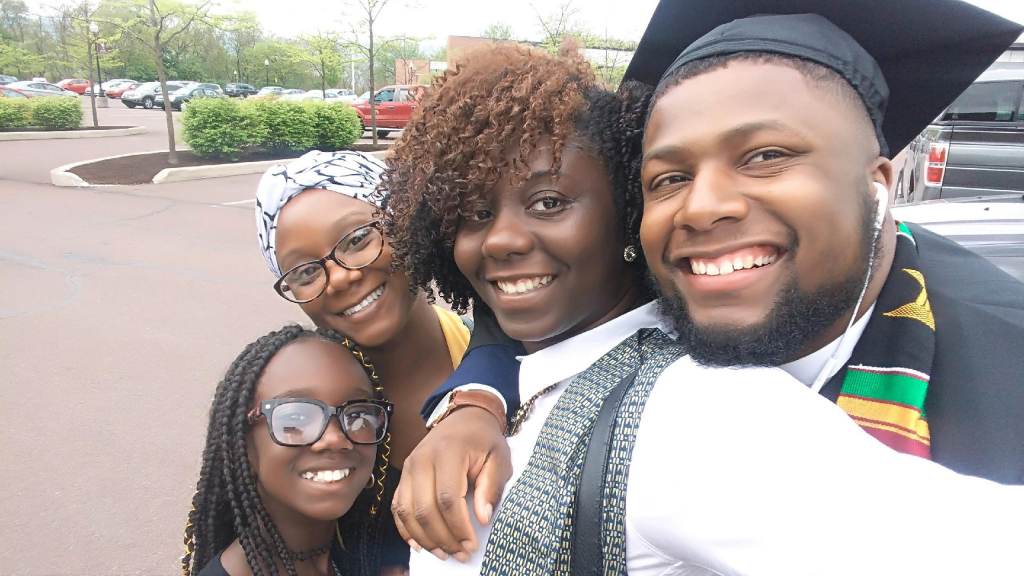
‘The system’s against me’
Why detail the low points of a young man’s life many years before he became a teacher?
Shakoor will tell you that his history is intertwined with what makes him better at teaching the children at his majority Black school in North Philadelphia.
“You can sympathize with those kids, but you can’t empathize with them,” he said to a white reporter. “I can empathize with them and sympathize. It’s a different experience being Black in America. Period. It is.”
Though the details of Shakoor’s life are unique to him, they echo what many Black men in this country experience. And they shed light on why so few Black men are even eligible to teach.
For instance, if Shakoor Henderson had been convicted of the felony robbery that he was accused of at age 19, he would not be a teacher in Pennsylvania right now. One-third of African American men have a felony conviction, according to research from the University of Georgia.
If the shooting death of Shakoor’s cousin had permanently derailed his college dreams, he would not be a teacher in Pennsylvania right now. A survey from Pew found that 57% of Black Americans know someone who has been shot, easily the highest rate among any racial subgroup.
If Shakoor’s time in juvenile detention had led to a life of recidivism, he would not be a teacher in Pennsylvania right now. Government data shows that Black people released from prison are the most likely to be rearrested within nine years.
Shakoor made bad decisions in his life. For years, he ignored advice and guidance from his family and teachers — people who repeatedly rallied around him. You cannot tell this story and take away his agency. He wouldn’t want it that way.
But if you want to know why Black males make up just 2% of the teaching force in this country, this data is impossible to ignore: A teacher must have at least a bachelor’s degree. Just 14% of Black men in this country have that credential. That’s less than half the national average, according to the Bureau of Labor Statistics.
Add it all up, and the odds are against the existence of Black male teachers.
“There are multiple exit ramps — and not a lot of on-ramps,” said Sharif El-Mekki, CEO of the Center for Black Educator Development, which aims to increase the number of Black teachers.
For many like Shakoor, that reality becomes too much to overcome.
“My cousin being killed, going into depression, all of those things packed into me, not caring and getting back into the streets and doing dumb stuff,” said Shakoor. “It’ll make you be like, ‘Man, forget this. The system’s against me, whatever, and forget it.’”
***
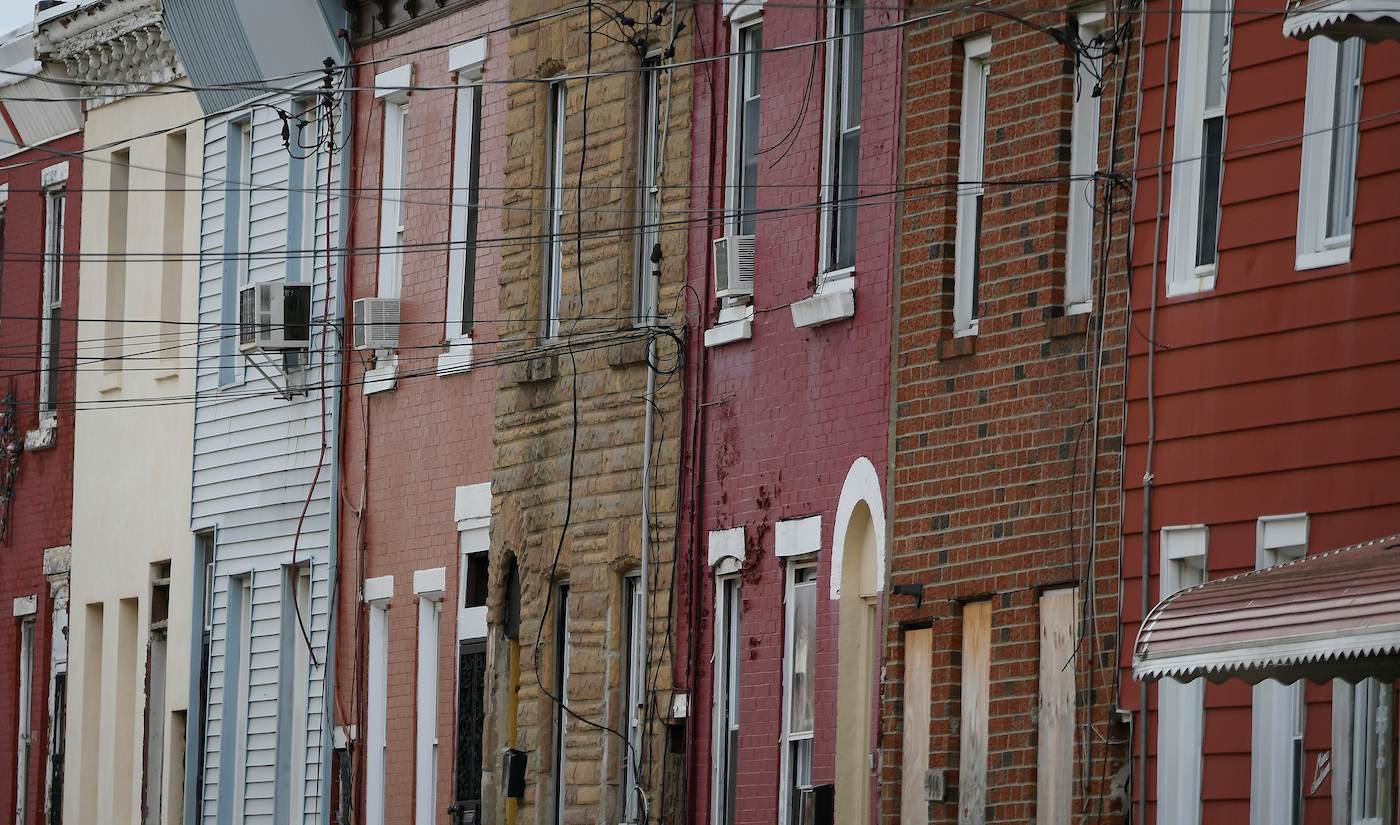
An emergency teacher
It was another Black male teacher — a friend of Shakoor’s sister — that convinced him to apply for a position in the School District of Philadelphia after he graduated college.
He landed at Bethune Elementary, a school that has long emphasized hiring Black male teachers. It’s a short drive from the North Philly block where his dad grew up — and where Shakoor spent summers as a kid.
He loved those summers. He felt a sense of belonging he never felt in Williamsport, bound up in the touch-turned-tackle football games with his cousins or the trips to buy hip-hop albums he couldn’t find back home.
There was always this prevailing wind, pushing him out of Williamsport and toward Philadelphia.
“For me, Philly is opportunity,” said Shakoor. “It’s traumatizing for [my parents]. Williamsport is their safe haven. Williamsport is their refuge, their escape. And it’s the same thing for me. Philly is my escape.”
Shakoor also felt at home in the classroom, where he seemed like a budding star. He could command a room of seventh graders without coming off harsh. He could relate to them without pandering.
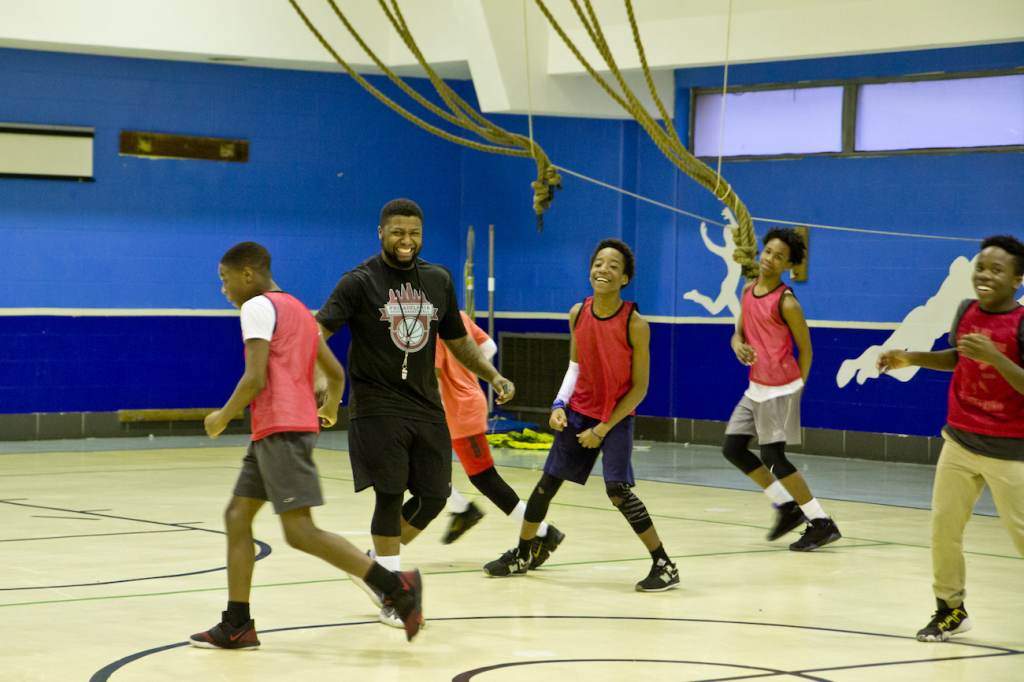
By the winter of 2020 — midway through his second year of classroom teaching — his life had definition and purpose.
But there was another hurdle standing between Shakoor Henderson and professional stability: licensure. In the state’s eyes, he was under-qualified to teach.
Because he hadn’t studied education as an undergrad, Shakoor needed a year-to-year emergency certification to stay in the classroom. And by the middle of his second year, he was on the verge of losing it.
In Pennsylvania, a person who doesn’t study teaching as an undergraduate must take postgraduate courses and then pass a series of tests to become a licensed teacher.
The person can ask for an emergency certification while completing that process, but the emergency license will expire if the person isn’t taking postgraduate courses. In essence, the state only wants to give emergency credentials to people who are working toward full licensure.
Shakoor, however, was struggling to get into a graduate program because of his poor college GPA — a relic of classes he’d failed four, five, and six years ago.
Unfortunately for Shakoor, his success as an actual teacher carried no weight in his bid to get fully certified. In the licensure system, Shakoor’s triumphs today mattered less than his failures as a young man.
“None of my teaching actually matters when it comes to me teaching next year,” Shakoor said, frustrated in the winter of 2020. “None of it.”

Get more Pennsylvania stories that matter
Paper qualifications
In the colonial era, communities often vetted potential teachers by asking local ministers to judge their moral character.
The roots of today’s state certification system traces back to the early 1800s, according to a history by the Thomas B. Fordham Foundation. In its infancy, the process included basic examinations in a few core subjects. In 1834, Pennsylvania may have been the first state to mandate that teachers display competency in reading, writing, and arithmetic.
Today, certification is far more complicated and formal. It typically centers on entrance tests and education requirements. The question is whether everything layered into the process over the last 200 years helps us separate the effective teachers from the ineffective ones.
Some experts are skeptical.
“In some ways, we’ve allowed this system to persist where all you have to do is get the paper qualification to have a career in teaching,” said Tom Kane, a professor of economics and education at Harvard University. “That’s not good for the profession.”
Kane co-authored a study that found the greatest predictor of future teacher excellence was the performance of that teacher’s students during their first few years in a classroom.
Kane believes a candidate’s level of training and education has some predictive power. But he believes it would be far better to let more people into the profession, study their effectiveness, and then use those measures to separate the wheat from the chaff.
And research shows that certification processes built around college GPA, postgraduate courses, and licensing exams disproportionately weed out prospective teachers of color.
Kane’s ideal licensure system would look more like the college tenure process — where final judgment happens after candidates spend some time on the job.
Of course, that would require a standardized metric based on student test scores or administrative observation. And that comes with hang-ups, chief among them the fact that “there are all sorts of reasons why kids might not learn that don’t have to do with the teacher,” said Robert Floden, dean of Michigan State University’s College of Education.
“It’s expensive to measure things with accuracy and validity,” Floden added. “And generally speaking, our systems aren’t set up to spend enough money to do a really good job measuring anything.”
In the absence of what he considers good measuring sticks, Floden believes it makes sense for states to use a combination of academic credentials and gateway exams to set some basic bar for competency.
For the people in Shakoor’s corner, the debate was purely academic, providing little comfort.
“I try to remind people that our educators come through the same broken systems that we’re now teaching in,” said Shakoor’s principal, Aliya Catanch-Bradley. “I think certification is absolutely necessary. You want to be responsible with who you’re putting in front of people’s children … But I think in every career path there needs to be some exceptions.”

‘Out of the chaos’
The profession got lucky with Shakoor. Years of licensing limbo seemed not to faze him. He was determined to be a teacher — one of the few Black men to make this job his life.
And, in this instance, the COVID-19 crisis proved helpful.
Because of the turmoil caused by COVID, Pennsylvania allowed teachers like Shakoor to re-up their emergency certifications. The extra time allowed Shakoor to find a graduate school that would accept him.
In summer 2020, he began accumulating the credits needed to secure full certification. By the fall, he and his girlfriend had bought a house together in Drexel Hill.
By May 2021, he was nesting comfortably in their new, brick rowhouse. He looked settled. He felt at ease.
“I made it. I’m not living check to check. I’m not scrambling. I’m not in the worst situations looking over my shoulder,” Shakoor said. “I’m out of the chaos.”
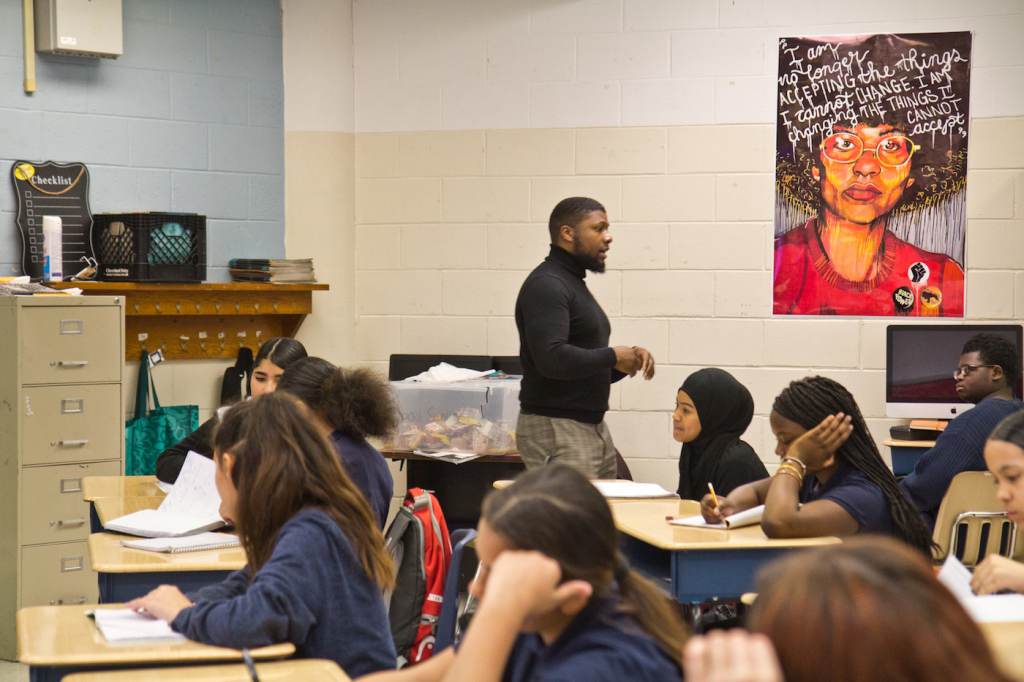
Shakoor’s ascendance comes at a time when society eagerly wants to find more people like him.
There’s been almost no change in the proportion of Black educators over the last three decades, but it’s become a source of emphasis thanks to new research.
Researchers — among them a professor at the University of North Carolina named Constance Linsday — found that Black male students were more likely to graduate high school and attend college if they had a Black teacher at some point in their lives. The effects were greatest among Black male students from “disadvantaged backgrounds.”
That data has drawn the attention of people as varied as former U.S. Secretary of Education John King and basketball star Tobias Harris, who visited Shakoor’s school in 2019 to talk about the importance of Black male educators.
Why do Black students seem to do better if they’ve had Black teachers?
No one knows for sure. There’s evidence that Black teachers have higher expectations of Black students and are less likely to suspend or expel Black students.
But that data isn’t so much an explanation as a vague, directional hint. It suggests that Black teachers — whether consciously or subconsciously — imbue their Black pupils with a sense of worth.
“They see their linked humanity, and they don’t give up on that child,” said El-Mekki, of the Center for Black Educators Development.
Shakoor’s journey is a testament to that possibility.
From his mom, his dad, and Coach Allen Taylor, he inherited the idea that he was worth something. And he treasures the opportunity to sow this sense of worth in others.
“Teaching fulfills so much for me,” said Shakoor. “I am a very proud Black man.”
Pride can be a source of stubbornness. It’s what tells you to block the slide when someone else is telling you to go down. But it’s also a source of resilience.
“You have to love who you are, because if you don’t, nobody will,” Shakoor said.
You don’t make it through six months in juvenile detention, four colleges, and two criminal cases without some pride. Pride is what draws you back to the city that nearly swallowed your parents, and tells you that you’ve got the power to change it.
“I love my people, and I’ve always wanted to help my people,” said Shakoor. “And teaching allows me to do that.”
It’s a passion that sustains Shakoor, even when the profession lets him down.
Shakoor learned in spring of 2020 that, due to declining enrollment at Bethune, he would have to split his time between math and social studies.
He wanted to keep teaching math full time, so he got a job at a nearby high school.
Shakoor said he wants to be the best math teacher in the world.
Period. Ever. That’s what I wanna do.
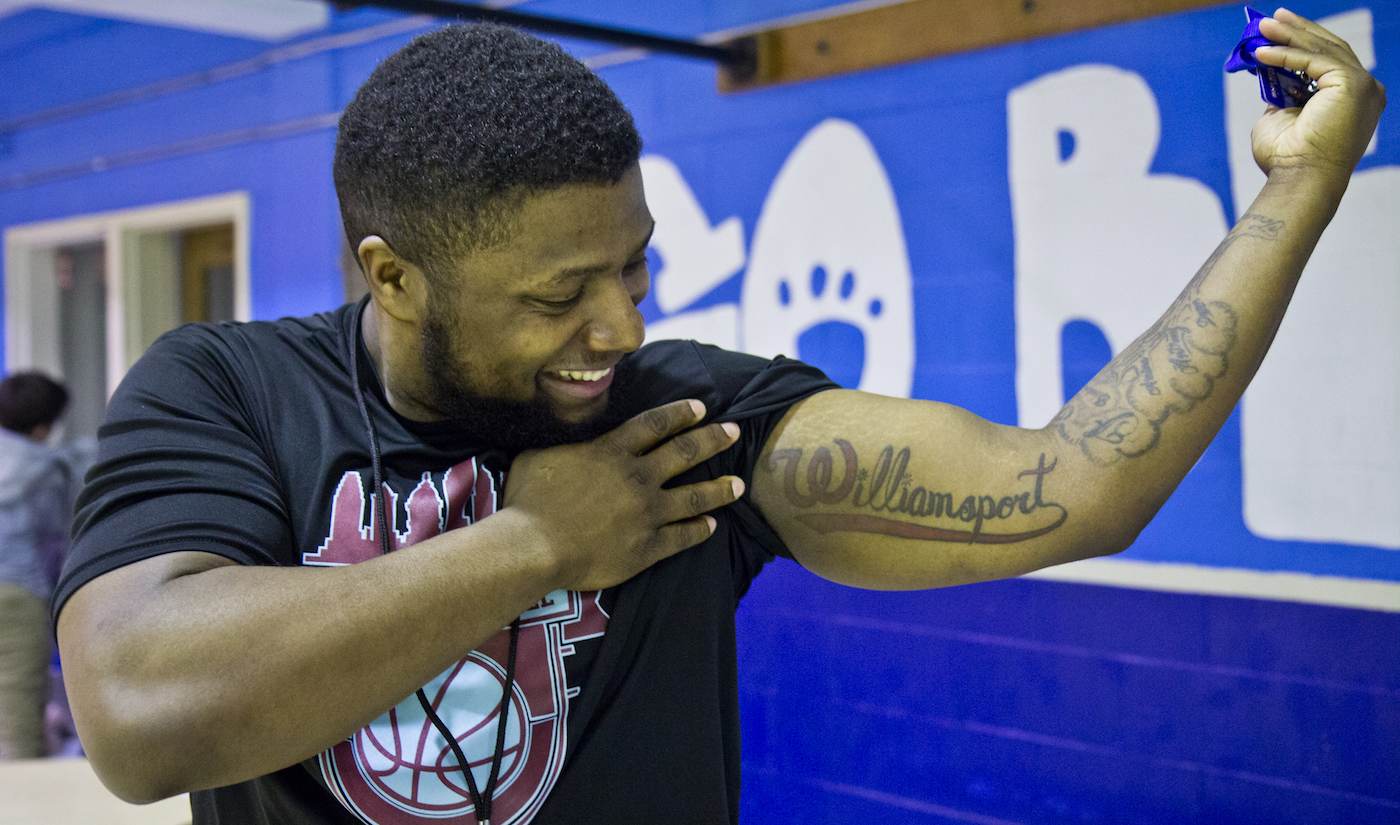
Starting this fall, Shakoor Henderson will teach algebra at Mastery Simon Gratz High School, the same subject Allen Taylor teaches at Williamsport Area High School.
And a kid will walk into Shakoor Henderson’s classroom seeking guidance.
And Shakoor will know what to do.
***
Schooled is made possible through a grant from the William Penn Foundation.
Reporter: Avi Wolfman-Arent, Editor: Kevin McCorry, Copy editor: Joanne McLaughlin, Sound mixer and engineer: Charlie Kaier, Digital producer: Evan Croen
WHYY is your source for fact-based, in-depth journalism and information. As a nonprofit organization, we rely on financial support from readers like you. Please give today.




